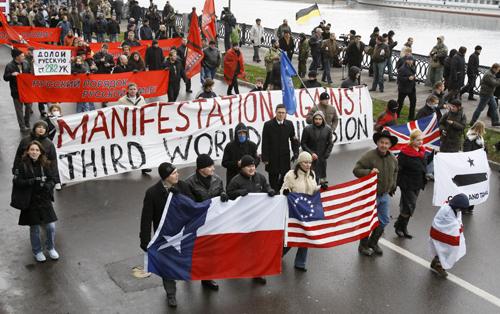Thousands of Russian nationalists stage anti-immigrant march in Moscow

Ultranationalist demonstrators, carrying an assortment of banners and flags, take part in their authorized rally in downtown Moscow, on Sunday. Demonstrators complained of the presence in Russia of dark-skinned migrants from other former Soviet republics, Alexander Zemlianichenko, The Associated Press
Nov 5, 2007
Last updated on May 12, 2016 at 06:15 p.m.
MOSCOW – A white supremacist from Texas lifted his black cowboy hat into the air as he stepped forward to address thousands of Russian nationalists at a rally Sunday in Moscow.
“I’m taking my hat off as a sign of respect for your strong identity in ethnicity, nation and race,” said Preston Wiginton, 43, exposing his close-cropped head to a freezing drizzle.
“Glory to Russia,” he said in broken Russian, as the crowd of mostly young Russian men raised their right hands in a Nazi salute and chanted “white power!” in English.
About 5,000 nationalists turned out for the Russian March, held for the third year on National Unity Day, a holiday the Kremlin created in 2005 to replace the traditional Nov. 7 celebration of the 1917 Bolshevik rise to power.
Get The Daily Illini in your inbox!
The Kremlin has tried to give the holiday historical significance by tying it to the 1612 expulsion of Polish and Cossack troops who briefly seized Moscow at a time of political disarray.
But extreme nationalists have seized on the holiday, reflecting a rise in xenophobia. More than 50 people have been killed and 400 injured in ethnically motivated attacks this year, according to the Sova rights center.
Rights activists say the extreme nationalist sentiments are a natural outgrowth of the Kremlin’s attempts to rebuild a strong Russian state.
President Vladimir Putin, who celebrated Sunday’s holiday by laying flowers at the monument to Moscow’s 17th century liberators, told the military cadets and pro-Kremlin youth group members who accompanied him that there are people in the world seeking to split Russia and divide up its natural resource wealth.
“Some believe that we are too lucky to possess so much natural wealth, which they say must be divided,” Putin said, speaking near the monument on Red Square. “These people have lost their mind,” he added with a smile.
Pro-Kremlin youth groups and the liberal Yabloko party also held rallies Sunday, in part to counter the nationalist march.
“This holiday is a gift for the most reactionary and dangerous group – the nationalists,” Yabloko deputy chairman Sergei Mitrokhin told a crowd of about 1,500.
Thousands of pro-Kremlin youth activists marched through central Moscow and gathered near Red Square to sew together a “blanket of peace,” symbolizing harmony among Russia’s numerous ethnic groups.
The nationalists, who were kept away from the city center, marched along an embankment of the Moscow River to a small square, waving banners that read “Russians, stand up,” ”Russian order or war,” and “Tolerance is AIDS.”
What united the marchers was their opposition to nonwhite migrants from the Caucasus and Central Asia.
“Russia will be white,” said Alexander Belov, leader of the Movement Against Illegal Migration. His last name, based on the Russian word for “white,” is a nom de guerre.
“Our ultimate goal is our race and nation. Nation above all,” he said, rephrasing the Nazi slogan “Germany above all.”
A top immigration official down played the significance of the Russian Marches.
“This is just an outbreak of national identity feelings, which is noticeable worldwide, and it has affected Russia too,” said Vyacheslav Postavnin, deputy director of the Federal Migration Service, the Interfax news agency reported.
In the first Russian March in 2005, thousands marched through central Moscow, some shouting “Heil Hitler.” The march horrified many Muscovites, and the following year it was blocked by police.
“The first Russian March was unexpected good luck, the second one was about overcoming the resistance of the authorities, and the third one is already a new Russian tradition,” said Konstantin Krylov of the nationalist Russian Social Movement.
City authorities approved Sunday’s march but ordered it held on the river embankment away from the city center. Hundreds of police lined the route.
Nationalist marches also were held in other Russian cities.
In St. Petersburg, about 500 people rallied at Revolution Square in front of the Winter Palace. Police detained 12 men who attempted to break into a Chinese restaurant, the Regnum news agency reported.
Associated Press writer Bagila Bukharbayeva contributed to this report





